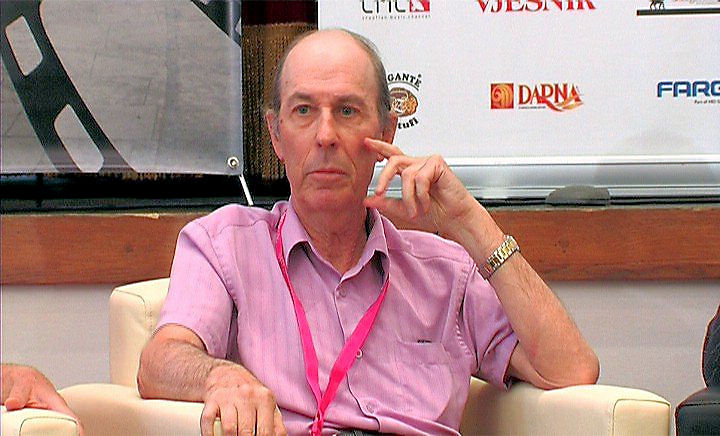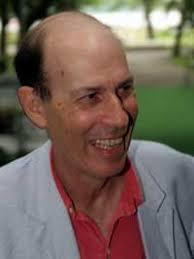In Memoriam Ronald Bergan
Ronald Bergan

My mother always had two core pieces of advice for me growing up. “Michael, always write thank you notes when someone does something nice for you,” and secondly, “when you meet someone new always ask questions and don’t talk about yourself incessantly, you can probably learn something.” I remember these words in my head as I went to my first international film festival in 2006. I was at the Viennale with my thesis film and I was extremely nervous to say the least. The festival has nightly dinners with all the guests and on my arrival I was seated at a table between a bunch of strangers who all seemed too cool to give me the time of day or even ask me my name. As I glanced around the table for someone to talk to I suddenly made eye contact with Ronald, who was wearing a baggy suit and tie and a devilish smile. He introduced himself, then instantly asked me my name, about my film, where I was from and where I studied. We continued our discussion through dinner as he made me laugh with his insane knowledge of cinema history and especially of Godard or as he called him in his elegant accent, “GOD-ard.” I remember writing an email to a friend later that evening and telling them what a character I had met.
I didn’t return to the Viennale for two years and when I did, the first night I was there I was at another festival dinner and in the midst of running into so many people I had met years before, they had all forgotten my name, our conversations, and for the most part my existence entirely. I eventually heard a voice over my shoulder say, “ah, Michael you’re back in Vienna, I see. So, you finished the short film, I take it?” I turned to see Ronald, sitting eating sushi with that same charming grin. I remember thinking in a world where most people think it’s cool to posture that they’re so preoccupied with their own life to not remember anything about you, here’s someone who puts that nonsense to rest and reminded me that there’s nothing cool about having a bad memory. Truly.
After that second meeting in Vienna we’d stay in touch via email and then would see each other from time to time at a festival somewhere in the world. He was one of the very few people I can say (after over a decade of traveling to festivals) that I actually looked forward to seeing and spending time with. He really had a knack for always leaving you with a phrase or thought that stuck with you.
When you look at Ronald’s writing, I think that translated to the way he approached discussing film too, he had such an amazing knowledge of cinema, but more importantly, the ability to be concise and sincere. I was rereading his article that appeared in Camera Lucida issue #2 “Why isn’t film history taught in schools?”, where as most film critics would bore you to tears with pages upon pages of obscure references and anecdotes, Ronald kept it to nine short paragraphs and in that is able to make a case that even my grandmother would understand and appreciate. He simply ends his argument with this:
“The oft-heard mantra that film should be considered merely as entertainment and not as art, and that any analysis of it reduces the enjoyment, patronises young people and limits their horizons. Enjoyment and knowledge are not mutually exclusive. In fact, knowledge of any art can only enrich one’s experience and increase one’s enjoyment”
Hearing the news of Ronald’s passing was a real punch in the gut. He was someone I looked up to, someone I was always nervous about showing my films to, one of the very few I was excited to spend time with in real life. I have a photo of Ronald and me together, it’s one of the last times I saw him, again in Vienna, but this time it was at a festival dinner we both were not invited to. We were standing outside the restaurant trying to come up with some silly scheme to crash the dinner… but we had no such luck. So, instead I offered to buy him a beer in exchange for notes on what he thought of my latest film. He agreed. So we sat in the lobby of the Hilton, laughing, talking, listening. That is something and someone I will truly, truly miss.
Mike Ott
Ronald Bergan was an authority on cinema and a much-needed voice in the age of generic film criticism overload. His was a unique and resected opinion but at the same time not one that was stuck in the past. He embraced the progressive changes in cinema as an institution and technology, always giving encouragement to younger critics and scholars too, not least as a University Lecturer. He wrote many books on cinema and had the respect and admiration of his contemporaries for his deep knowledge. Ronald's obituaries for The Guardian from 1989 to his death were always an enjoyably and insightful read, shedding new light and opinions on the lives of those passed, whether famous or less so. He will be greatly missed, not least as a colleague for Fipresci and Camera Lucida.
Steven Yates
 RONALD BERGAN
RONALD BERGAN
THE CRITIC AND HIS LEGACY
Ronald Bergan, film critic, biographer, author and professor, a scholar whom we were not prepared to dismiss, has left us an unavoidable legacy of essential essays, but he also knew how to represent that third way that combines erudition and rigorous analysis with disclosure in the pages of the daily press.
Although, unfortunately, I never had the opportunity to meet him personally or to share conversations or debates in juries, like other of my more fortunate colleagues, I feel legitimized to contribute these brief lines of homage to a master of critics and film lovers, based on the admiration I feel for an impeccable career.
Nowadays, film criticism, cultural journalism and professional reflection on different artistic manifestations are devalued, cornered at the stroke of a witty tweet, reduced to a residual, if not marginal, product, replaced by easy synopses, content marketing or commercial commitment reviews.
In this unflattering panorama, which is not at all conducive to debate, plurality and balanced polyphony, where well-founded acuity and reflection are undervalued, it is more necessary than ever to prevent a personality such as that of Ronald Bergan, a bastion of professionalism and exigency, from fading away over time.
To forget or archive as belonging to other times the way of doing and exercising a work unfairly threatened nowadays, would be to write a painful ending, that of a passionate film with a protagonist whose dignified and relevant career ends at the same time as him. However, knowing the stature of his disciples and unconditional friends, I hope that his legacy will endure, but not only in the form of his writings, but above all as a living legacy, even if we risk not finding job, because, as he wrote, "we know too much about cinema".
As long as passion ignites our texts, let us not be afraid to face the big issues and let us be faithful to our own criteria with humility and conviction, not forgetting the necessary daring not to run away from the debate, the legacy will remain alive. The path along which new critics (who have read Eisenstein and Bergan) will arrive will remain clean and accessible.
Eva Peydró
Whenever I need biographical information about a filmmaker who has already passed away, the first article I look for is the obituary of The Guardian: written by ingenious Ronald Bergan. He had such a deep and wide knowledge of cinema that he was capable of analyzing the life and works of a filmmaker in the best way possible. He had a very distinguished style and to read his articles was sheer pleasure besides learning a lot from him. He was also polemical, he respected our profession, and demanded that respect from others, too. I had the honour and opportunity to meet Ronald Bergan at FIPRESCI General Assemblies and at a few festivals. I must admit that besides the critic Ronald Bergan, I cherish the memory of the husband Ronald Bergan. I have rarely seen a man so affectionately capable of looking after his wife who needed constant care. I witnessed his humane side the first time I met him. Intelligence, intellect, wit, knowledge... Those are the qualities we should value the most in Ronald Bergan perhaps, but in my memory he will forever be carved holding gently the arm of his wife, and watching her steps.
Alin Tasciyan

